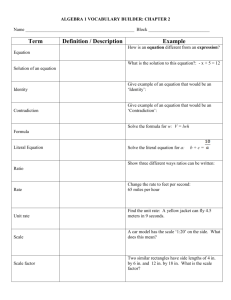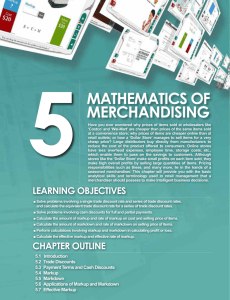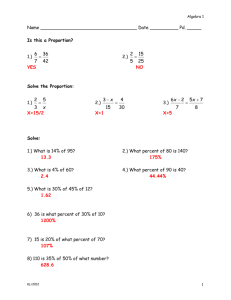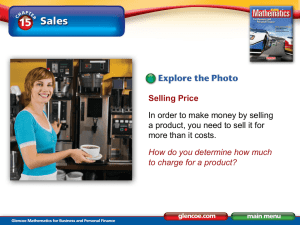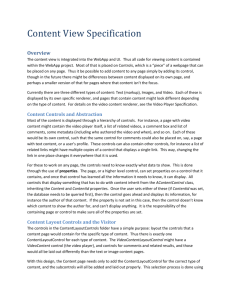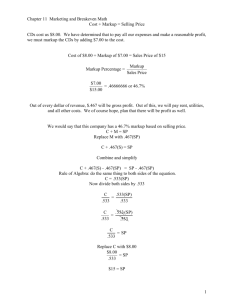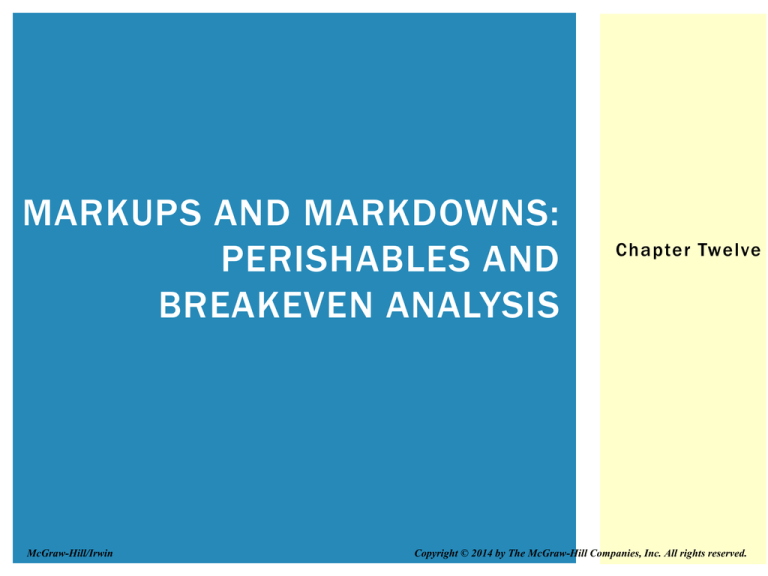
MARKUPS AND MARKDOWNS:
PERISHABLES AND
BREAKEVEN ANALYSIS
McGraw-Hill/Irwin
Chapter Twelve
Copyright © 2014 by The McGraw-Hill Companies, Inc. All rights reserved.
LEARNING UNIT OBJECTIVES
LU 1 2-1: Markups Based on Cost (100%)
1.
Calculate dollar markup and percent markup on cost.
2.
Calculate selling price when you know cost and percent
markup on cost.
3.
Calculate cost when dollar markup at percent markup on cost
are known.
4.
Calculate cost when you know the selling price and percent
markup on cost.
12-2
LEARNING UNIT OBJECTIVES
LU 12-2: Markup Based on Selling Price (100%)
1. Calculate dollar markup and percent markup on selling price.
2. Calculate selling price when dollar markup and percent markup on
selling price are known.
3. Calculate selling price when cost and percent markup
on selling price are known.
4. Calculate cost when selling price and percent markup
on selling price are known.
5. Convert from percent markup on cost to percent markup on selling
price, and vice versa.
LU 12-3: Markdowns and Perishables
1. Calculate markdowns; compare markdowns and
markups.
2. Price perishable items to cover spoilage loss.
12-3
LEARNING UNIT OBJECTIVES
LU 12-4: Breakeven Analysis
1.
Calculate contribution margin.
2.
Calculate breakeven point.
12-4
TERMINOLOGY
Selling Price - The price retailers charge customers.
Cost -
The price retailers pay to a manufacturer or supplier to bring goods
into the store.
Markup, Margin, or Gross Profit - The difference between the cost of bringing the
goods into the store and the selling price of the
goods.
Operating Expenses or Overhead - The regular expenses of doing business, such as
wages, rent, utilities, insurance, and advertising.
Net Profit or Net Income - The profit remaining after subtracting the cost of
bringing the goods into the store and the operating
expenses from the sale of the goods (including any
returns or adjustments).
12-5
BASIC SELLING PRICE FORMULA
Assume Gap plans to sell hooded fleece jackets for $23 that
cost them $18.
The markup (M) is a dollar amount, or a dollar markup.
12-6
MARKUPS BASED ON COST (100%)
Cost + Markup = Selling price
100%
Cost is 100% the Base
27.78%
127.78%
Dollar markup
is the portion
Percent markup on cost is
the rate
12-7
CALCULATING DOLLAR MARKUP AND
PERCENT MARKUP ON COST
Gap buys fleece jackets for $18. They plan to sell them for
$23. What is Gap’s markup? What is the percent markup on
cost?
Dollar markup = Selling price -- Cost
$5 =
Percent markup on cost = Dollar markup
Cost
$5
$18 = 27.78% or .2778
Cost (B) =
Dollar markup
Percent markup on cost
$23 -- $18
$5 = $18
.2778
Check Selling price = Cost + Markup
$23 = $18 + .2778($18)
$23 = $18 + $5
12-8
CALCULATING SELLING PRICE WHEN YOU
KNOW COST AND PERCENT MARKUP ON COST
Mel’s Furniture bought a lamp that cost $100. To make Mel’s
desired profit, he needs a 65% markup on cost. What is Mel’s
dollar markup? What is his selling price?
S = C + M
S = $100 + .65($100)
S = $100 + $65
S = $165
Dollar Markup
Selling Price
12-9
CALCULATING COST WHEN YOU KNOW SELLING
PRICE AND PERCENT MARKUP ON COST
Jill Sport, owner of Sports, Inc., sells tennis rackets for $50.
To make her desired profit, Jill needs a 40% markup on cost.
What do the tennis rackets cost Jill? What is the dollar
markup?
Calculate
the cost:
S (Selling Price) = C (Cost) + M (Markup)
$50 = C
+ .40(C)
$50 = 1.40C
1.40
1.40
$35.71 = C
Calculate
the dollar
markup:
M =
M =
M =
S
C
$50 - $35.71
$14.29
12-10
MARKUPS BASED ON SELLING PRICE
(100%)
Percent (%) markup on selling price is the rate (R)
Dollar ($) markup is the portion (P)
Selling price is 100% - the base (B)
Cost
+ Markup
=
78.26%
+ 21.74%
=
Selling price
100%
12-11
CALCULATING DOLLAR MARKUP AND
PERCENT MARKUP ON SELLING PRICE
The cost to Gap for a hooded fleece jacket is $18; the
store then plans to sell them for $23. What is Gap’s dollar
markup? What is its percent markup on selling price?
Dollar markup = Selling price -- Cost
$5
=
$23
-- $18
Percent markup on selling price = Dollar markup
Selling price
$5
= 21.74%
$23
Selling price (B) =
Dollar markup (P)
Percent markup on SP (R)
$5
.2174
Check
Selling price = Cost + Markup
23 = 18 + .2174($23)
$23 = $18 + $5
= $23
12-12
COMPARE MARKUP ON COST VERSUS
MARKUP ON SELLING PRICE
Percent Markup Based on Selling Price
$5
$23
= 21.74%
Percent Markup Based on Cost
$5
= 27.78%
$18
Be careful to substitute the correct value – selling price or cost –
into the denominator.
12-13
CALCULATING SELLING PRICE WHEN YOU
KNOW COST AND PERCENT MARKUP ON
SELLING PRICE
Mel’s Furniture bought a lamp that cost $100. To make Mel’s
desired profit, he needs a 65% markup on selling price. What
are Mel’s selling price and his dollar markup?
Calculate
the selling
price:
S (Selling price) = C (Cost) + M (Markup)
S
- .65S
.35S
.35
S
Calculate
the dollar
markup:
= $100
+ .65S
- .65S
= $100
.35
= $285.71
M = S
-- C
M = $285.71 -- $100
M = $185.71
12-14
CALCULATING COST WHEN YOU KNOW
SELLING PRICE AND PERCENT MARKUP
ON SELLING PRICE
Jill Sport, owner of Sports, Inc., sells tennis rackets for $50. To
make her desired profit, Jill needs a 40% markup on selling
price. What is the dollar markup? What do the tennis rackets
cost Jill?
S (Selling price)
$50
$50
- $20
$30
=
=
=
=
C (Cost) + M (Markup)
C
+ .40($50)
C
+ $20
- $20
C
Dollar Markup
12-15
MARKUP BASED ON COST VERSUS
MARKUP BASED ON SELLING PRICE
(TABLE 12.1)
12-16
CONVERSION
Formula for Converting Percent
Markup on Cost to Percent Markup on
Selling Price:
Formula for Converting Percent Markup
on Selling Price to Percent Markup on
Cost:
Percent markup on cost
1 + Percent markup on cost
Percent markup on selling price
1 -- Percent markup on selling price
.2778 = 21.74%
1 + .2778
.2174 = 27.78%
1 -- .2174
12-17
MARKDOWNS
Markdown percent =
Dollar markdown
Selling price (original)
Dollar markup = Original selling price – New selling price
Example:
Kmart marked down an $18.00 video to $10.80. Calculate the dollar
markdown and the markdown percent.
$18.00 -- $10.80 = $7.20 markdown
Dollar markdown
= 40%
= $7.20
Selling price (original)
$18.00
12-18
PRICING PERISHABLE ITEMS
Audrey’s Bake Shop baked 20 dozen bagels. Audrey expects 10% of the
bagels to become stale and not salable. The bagels cost Audrey $1 .20
per dozen. Audrey wants a 60% markup on cost. What should Audrey
charge for each dozen of bagels so she will make her profit?
TC (Total Cost) =
TS (Total Sales) =
TS
=
TS
=
TS
=
20 dozen x $1.20 = $24.00
TC + TM (Total Markup)
$24 + .60($24)
$24 + $14.40
Total dollar markup
$38.40
Total selling price
20 dozen X .10 = 2 dozen
$38.40 = $2.13
18
Selling price per dozen
20 -- 2
12-19
CALCULATING A CONTRIBUTION
MARGIN (CM)
Contribution margin (CM) = Selling price (S) – Variable cost (VC)
Example:
Assume Jones Company produces pens that have a selling price
(S) of $2.00 and a variable cost (VC) of $.80. We calculate the
contribution margin (CM) as follows.
CM = $2.00 (S) -- $.80 (VC)
CM = $1.20
12-20
CALCULATING A BREAKEVEN POINT
(BE)
Breakeven point (BE) =
Fixed costs (FC)
Contribution margin (CM)
Example:
Jones Company produces pens. The company has a fixed
cost (FC) of $60,000. Each pen sells for $2.00 with a
variable cost (VC) of $.80 per pen.
Breakeven point (BE) =
$60,000 (FC)
= 50,000 units (pens)
$2.00 (S) - $.80 (VC)
At 50,000 units (pens), Jones Company is just
covering its costs. Each unit after 50,000 brings in
a profit of $1.20 (CM).
12-21

